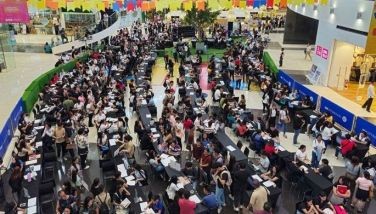Aussies propose refs development program
MANILA, Philippines - Top-grade Australian referee-coaches John Martin and Alan Garraway recently urged the SBP and PBA to activate a long-term development program for Filipino game officials as the Philippines embarks on a major drive to compete with basketball’s major powers on the global stage.
Martin, 69, and Garraway, 61, boast a combined 98 years of officiating experience and were in town last week to conduct a three-day workshop for 15 PBA and 10 PBA D-League referees and 13 so-called academicians, including six females at the JCSGO (Jesus Christ Saves Global Outreach) Gym in Cubao. The workshop was originally scheduled for four days but was compressed as typhoon Glenda washed out one day.
Both Australians are among 14 National Basketball League (NBL) referee-coaches overseeing 36 arbiters who work regular season and playoff games in Australia’s version of the NBA. Referee-coaches act as evaluators and rate performance on a scale of 1 to 5 covering game management, positioning, foul selection, communication and presentation.
“We submit three reports for every game,” said Martin who served as referees commissioner during the 2000 Sydney Olympics and six FIBA World Cups. “The first is called the Positive Negative Interesting or PNI sheet which lists down our comments and observations. The second is called the Bunn Sheet, named after the late American coach and Hall of Famer John Bunn. This details how a referee called a game. Then, there is the final report which sums up everything and rates a referee’s performance.”
Martin said in the NBL, referees are given game assignments three weeks in advance. “There is no gambling issue in the NBL so we don’t need to draw lots for referee assignments an hour before a game,” he said. “I think it’s good that referees know ahead of time which games they’ll work so that they can prepare well. They can discuss among themselves the tendencies of the players, the styles of each team, who are the nasties, the shooters.”
Martin and Garraway are also referee-coaches in national federation-sanctioned competitions. They recently supervised the Australian U16 and U18 tournaments where 28 referees worked 122 total games involving 28 teams. “We want to be close to the ground when it comes to FIBA rules,” said Martin. “We understand that after the 2014 FIBA World Cup, there will be some rule changes like a 14-second shot clock reset after an offensive rebound, one shot and possession as penalty for a technical foul and strict application of the no-charge, semi-circle zone. In the 3x3, the rules are very different and even the ambiance is unique with DJs and music blaring. It’s basketball’s version of futsal.”
Garraway, who has worked the Oceania Championships, said he saw “great potential” in the 38 participants who enrolled in the workshop. “We were impressed with their ability to learn quickly,” he said. “In the beginning, they were a bit shy. But as the workshop got underway, they came out of their closet. They’re a nice pool of talent, very positive in their outlook. We did demos and most made the right calls. I think referees should build their confidence and enjoy the support of the league owners.”
Martin said he reviewed the last play of Game 1 of the recent PBA Governors Cup Finals between San Mig Coffee and Rain Or Shine. That was when the referees didn’t blow their whistles on an apparent contact between Paul Lee attempting a three-point shot and Marc Pingris defending. “We reviewed the tape from two angles and we thought it was the right no-call,” said Martin. “You apply the principle of verticality on the defensive player and it looked like the defender went straight up and the offensive player leaned in to cause the contact. One of the most difficult calls to make is the charge or block. In any call, a referee must always consider advantage or disadvantage. When a referee blows his whistle, he must be decisive and precise. He must be convincing and that means he has to sell the call. In a way, a referee has a marketing responsibility and must also be a politician.”
Garraway said their visit should be a beginning, not an end. “This can’t be a one-off,” he said. “I think there should be a follow-up not only with the PBA and the PBA D-League but also to start a program with the NCAA and UAAP referees. The important thing is to create a clear pathway for referees to get to the next level. That requires constant evaluation and the creation of a pool of referee-coaches. Education must be continuous because basketball technology is evolving.”
Martin said the most serious officiating fiasco in basketball history tainted the finals of the 1972 Munich Olympic basketball tournament between the US and the Soviet Union. “The referees couldn’t make up their mind on what to do in the dying seconds and had to ask FIBA secretary-general William Jones for advice,” he said. “They replayed the dying seconds twice or thrice until the Soviet Union scored to win the gold medal. That prompted FIBA to designate a game commissioner starting in 1977 or 1978. The commissioner was given the power to supervise a game.”
New South Wales Basketball CEO Danny Martinez, a Filipino who migrated to Australia in 1986, accompanied the referee-coaches to Manila. Martinez said he welcomes a close working relationship with the SBP and PBA. “We’re grateful to PBA chairman Mon Segismundo and PBA commissioner Chito Salud for opening the doors for us to work together,” he said. “There are many more exchange activities we can do to benefit our players, coaches and referees. Australia is a world power in basketball and in any way we are able to contribute to the development of Philippine basketball, we’re ready.” Australia will join the Philippines in a new Asia-Oceania bracket where there will be seven qualifiers for the expanded 32-team FIBA World Cup starting in 2019.
The 38 workshop participants were Art Herrera, Nol Quilinguen, Peter Balao, Jimmy Mariano, Edward Aquino, Rommel Gruta, Emi Tangkion, Rolando Dacanay, Jun Marabe, Noy Guevara, Bing Oliva, John Cabiles, Mardy Montoya, Rey Yante and Sherwin Pineda of the PBA, Gerry Borja, Nino Cortez, Jeff Lunar, Ronaldo Ibay, Melchor Lasaga, Jonnel Diaz, Nick Ranido, Allan Balatucan, Michael Flordeliza and Albert Nubla of the PBA D-League and Karizza Ceballos, Jane Umana, Mau Orioste, Janine Nicandro, Faye Tria, Jill San Diego, Francis Bello, June Mar Robles, Rhuden Lamprea, Dominador Obina, Benjamin Montero, Anthony Redona and Richard Fontanilla of the “academicians.”
- Latest
- Trending






























